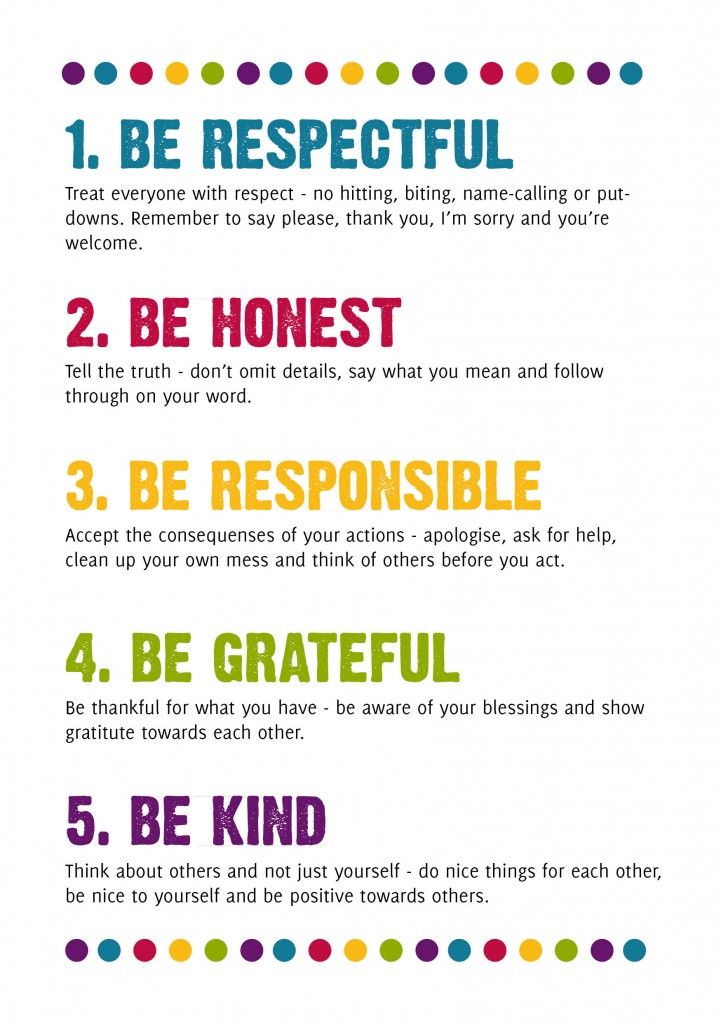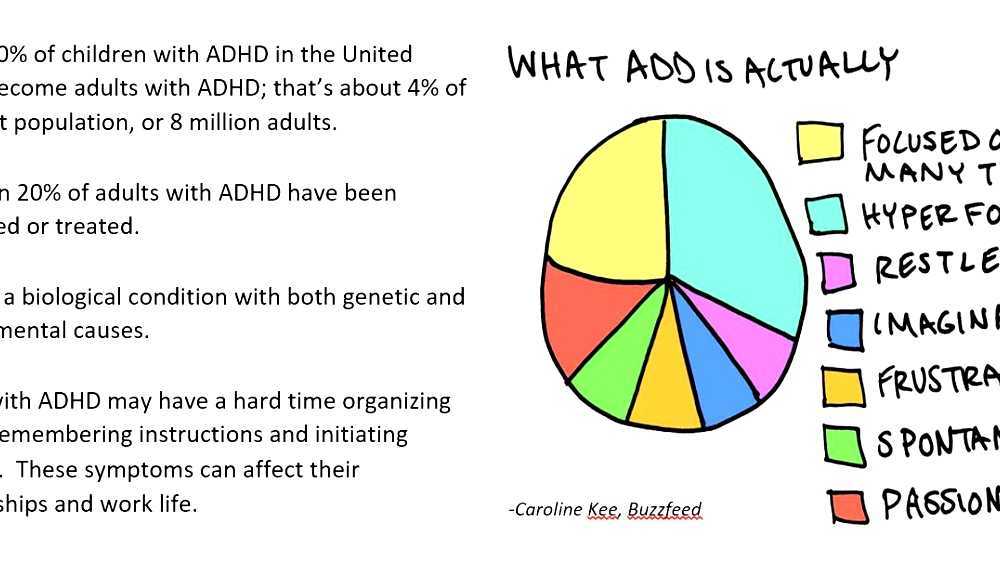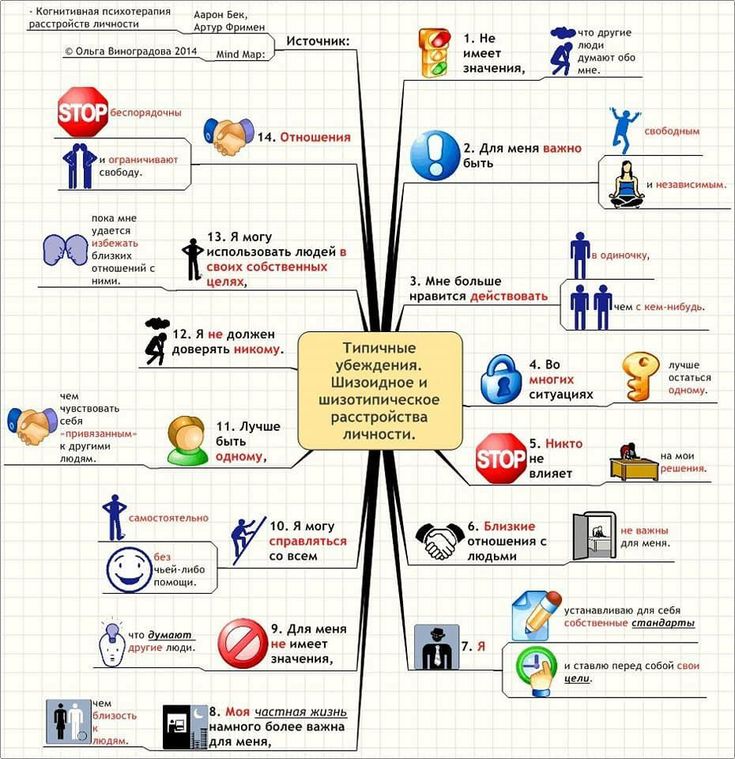Good house rules for kids
Family Rules | Creating Structure | Essentials | Parenting Information
Family rules help create structure. A family rule is a specific, clear statement about behaviors you expect from your child. Rules work best when there is consistency, predictability, and follow-through.
Why are family rules important?
Family rules help children understand what behaviors are okay and not okay. As children grow, they will be in places where they have to follow rules. Following rules at home can help children learn to follow rules in other places. It is normal for children to break rules and test limits. Consistent follow through with consequences when rules are broken help your child have a clear understanding about the importance of rules. Remember, young kids sometimes break rules because they simply forget. Not all broken rules occur because kids are testing the limits. But, our responses should be the same no matter what the reason for breaking the rule.
Why should all family members know and follow the rules?
For family rules to work well, everyone needs to know, understand, and follow the rules. By doing this, children don’t get mixed messages about what is okay or not okay. For example, you know screen time should be limited for young children and you want dinner time to be family time so you set a family rule that no screens are allowed during dinner time. If another caregiver checks their phone during dinner, your child may be confused. Your child’s behavior will be better if all caregivers support the rules in the same way. This is true for parents, grandparents, or any other caregivers in your child’s life.
How can all family members get on the same page about rules?
There are several steps that can help all family members be consistent. Parents or caregivers can:
- talk about what rules would help their family and agree which ones to set
- post the rules in the house so everyone can know them
- talk with other adults who care for their children about the rules to make sure everyone knows what is allowed and not allowed
- ask all caregivers to be consistent in monitoring and enforcing the rules
- remind children about the rules by repeating and posting them in the home
What is a good number of family rules for toddlers and preschoolers?
The number of rules you set depends on your child’s ability to understand and remember.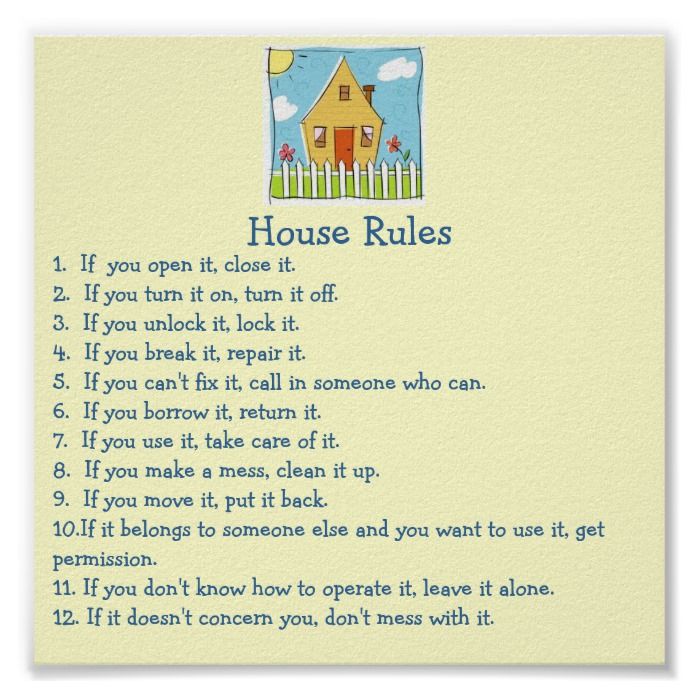 It is also hard for parents to consistently enforce lots of new rules. For young children, focus on only two or three of the most important rules at any one time. As your child learns a rule and is following it consistently, you can add new rules.
It is also hard for parents to consistently enforce lots of new rules. For young children, focus on only two or three of the most important rules at any one time. As your child learns a rule and is following it consistently, you can add new rules.
Steps for Creating Family Rules
Family rules help create structure because children know what behaviors are okay and which ones are not okay. The steps for creating family rules are below
Identify and clearly define the rules. Toddlers and preschoolers can only learn and remember two to three rules at any one time. Try starting with one rule to give children a chance to learn how family rules work before others are added. Family rules should also be realistic and fit your child’s age. The rule should be something that your toddler and preschooler can obey.
Avoid vague rules, such as “be good.” “Be good” includes many different things and could be hard for a child to understand. A more specific rule would be “Talk to other how you would like them to talk to you.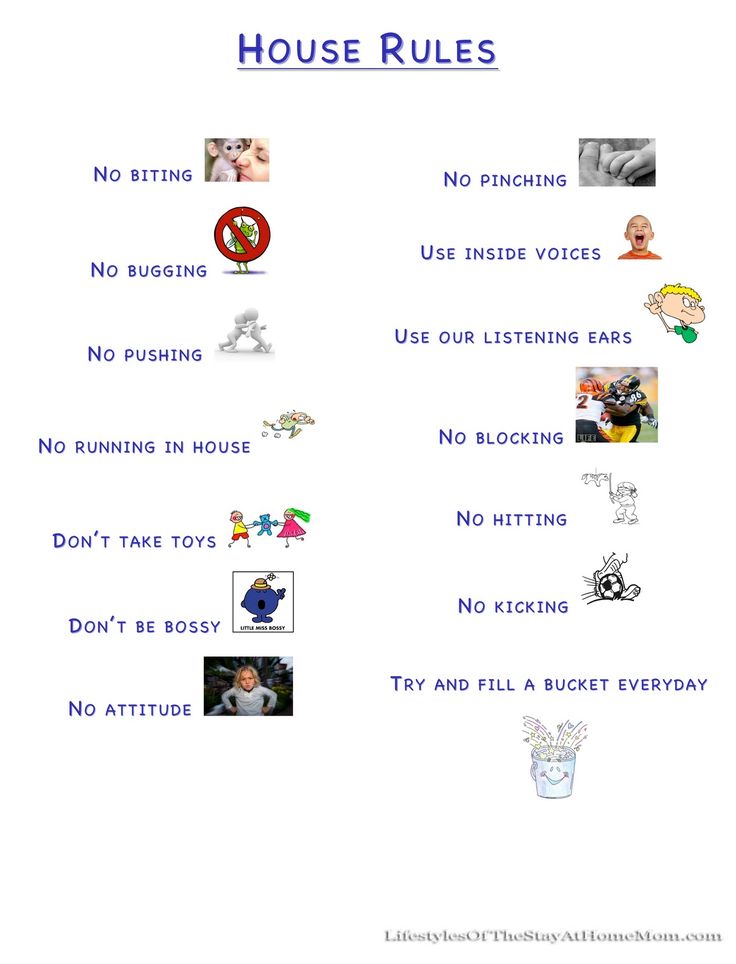 ” Unacceptable behaviors should be stated as a clear and concrete rule, such as “No hurting others.” It is also important to state the acceptable or desired behavior immediately after the rule so your child knows what behavior you expect. For example, if you have told your child, “No hurting others,” you can follow that up with “You need to keep your hands and feet to yourself.”
” Unacceptable behaviors should be stated as a clear and concrete rule, such as “No hurting others.” It is also important to state the acceptable or desired behavior immediately after the rule so your child knows what behavior you expect. For example, if you have told your child, “No hurting others,” you can follow that up with “You need to keep your hands and feet to yourself.”
Examples of common family rules:
- No hurting. Keep your hands and feet to yourself.
- No interrupting. Wait for your turn to speak.
- No yelling in the house. Use an inside voice when talking in the house.
- No climbing or jumping on furniture. Sit on the couch or lie down on the bed.
Make sure your child knows and understands the rules. Check your child’s understanding by having her repeat the rule in her own words. For toddlers and preschoolers, you may need to help them understand what some words in the rule mean. For example, if the rule is “no hurting others,” you may need to describe what “hurting” means.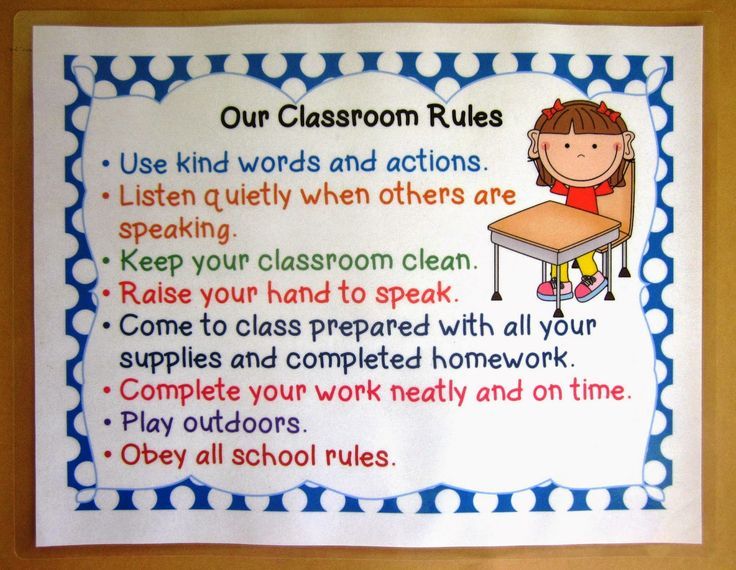 When a child first hits, bites, or kicks someone, you may need to say, “Hitting is hurting. Our rule is no hurting. You should keep your hands to yourself.”
When a child first hits, bites, or kicks someone, you may need to say, “Hitting is hurting. Our rule is no hurting. You should keep your hands to yourself.”
Toddlers and preschoolers need frequent reminders about the rules. Rules can be repeated often and you can place reminders, such as rules charts, in places where everyone can see them. Good locations to place rule charts include the refrigerator door or on another door that everyone uses.
The family rules chart should contain at least two columns: the rules and the consequences for breaking the rules. Pictures or visual cues can be used on charts for toddlers and preschoolers because they cannot read. Click here to create a family rules chart.
All family members should follow the family rules, given they are “family” rules. Young children look to their parents to learn how to behave. For example, if you are respectful and listen to other adults, you can teach your child to listen to adults.
When you see your child following the rules, you can let her know you see her making good choices by providing a labeled praise.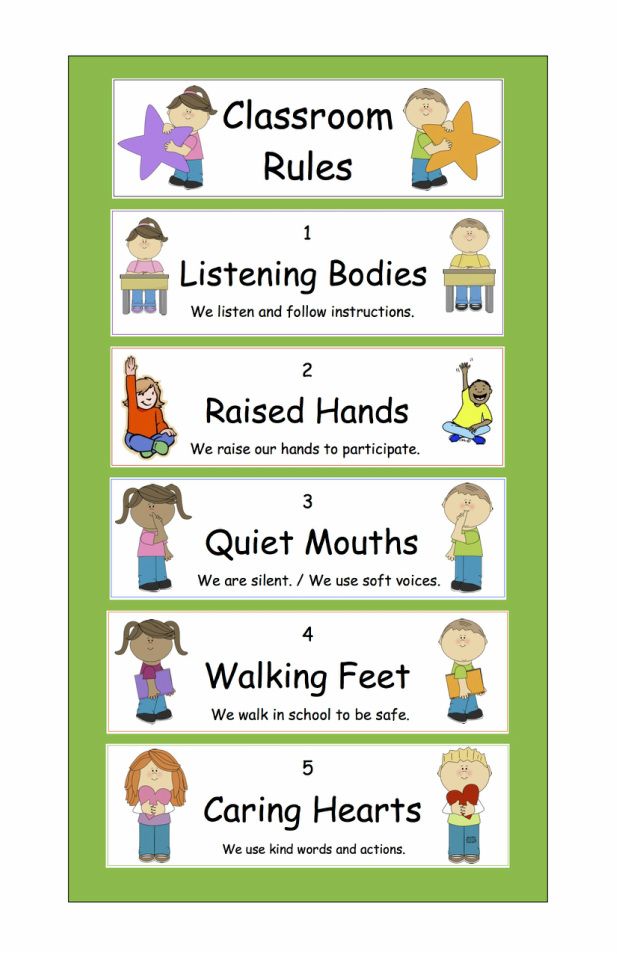 Labeled praise lets your child know exactly what she has done that you liked. The praise should occur as soon as you notice your child’s behavior. Praise should be used a lot when you create a new rule to help your child get used to this new expected behavior.
Labeled praise lets your child know exactly what she has done that you liked. The praise should occur as soon as you notice your child’s behavior. Praise should be used a lot when you create a new rule to help your child get used to this new expected behavior.
When family rules are always enforced, your child’s behavior and your relationship will be better. Family rules should receive an immediate response when broken. Consequences for breaking family rules should be clear to the parent and child. They are included on the rules chart as a reminder of what to expect. Consequences for broken family rules should be enforced immediately.
Top of Page
26 House Rules For Kids To Help Them Grow Responsible
Practical tips for establishing child-friendly boundaries and maintaining a peaceful environment at home.
Image: Shutterstock
House rules for kids are helpful to create a stress-free atmosphere at home. They help provide a basic structure about how the family functions, creating an environment for disciplined upbringing.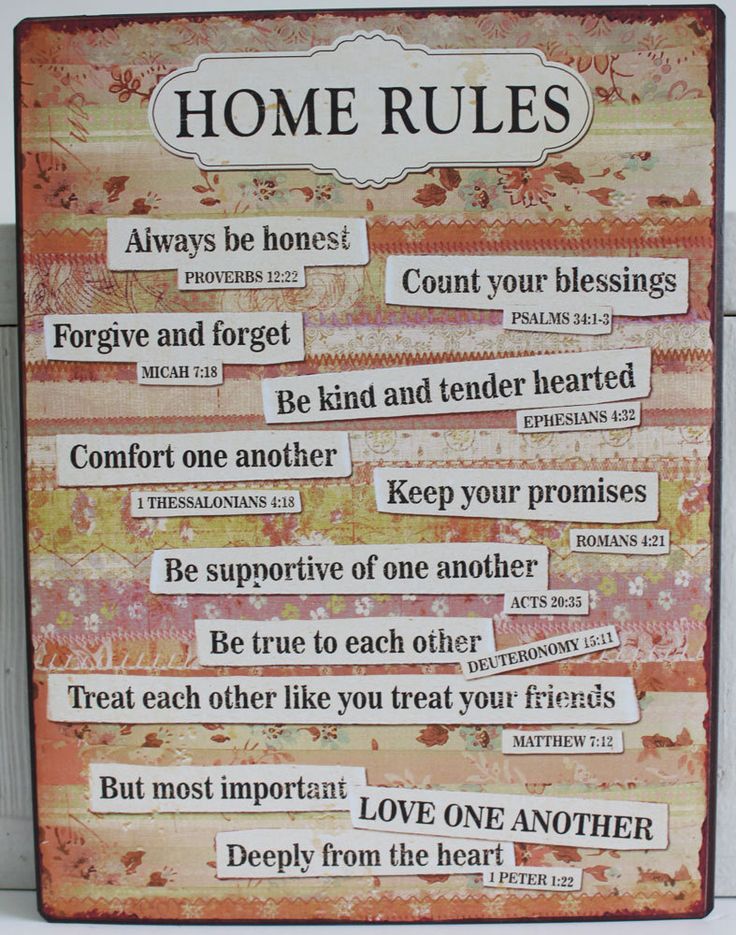 House rules clearly state your expectations, and following them makes everyone’s life easier in the family. Children also tend to feel safer in a home where household rules are implemented and followed.
House rules clearly state your expectations, and following them makes everyone’s life easier in the family. Children also tend to feel safer in a home where household rules are implemented and followed.
House rules do not have to be complicated, and you need not always enforce them strictly. However, following these rules as frequently as possible can help children know what to expect from their surroundings and grow up as disciplined individuals.
This post brings some applicable house rules that you may use for your children. We also provide you with tips about ensuring that the children agree to and follow the rules.
Tips For Creating House Rules For Kids
Creating rules is the easy part. But how do you ensure that your children follow them? Here are some tips for creating house rules for kids.
1. Ask them for their input
Rules are created to ensure your children’s safety, and some of them are non-negotiable. Not opening the door without checking who is outside, not crossing the road without checking both sides, not touching hot or sharp objects, etc.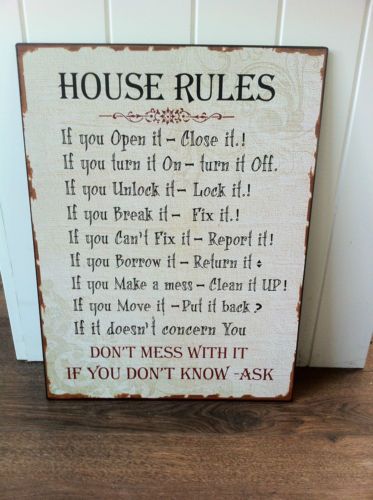 , are some rules that are mainly set for their safety and should always be enforced.
, are some rules that are mainly set for their safety and should always be enforced.
However, make sure you ask their opinion before you enforce the rules on them. Asking them, “What do you think?” goes a long way in boosting their confidence and making them feel included.
Related: 10 General Safety Rules You Should Teach Your Children
2. Take everyone’s schedules into account
Before you make any rules for the family, you must ensure you take everyone’s schedules and needs into account.
How big is your family? How old are the children? Do you have pets? Do any of the family members have any allergies or medical conditions that everyone needs to remember? Ensure you make rules that accommodate all of these conditions.
3. Consider their age and maturity level
When you introduce rules to your children, you must take their age and maturity level into account. Experts believe that you can introduce rules to your children once they are school-aged.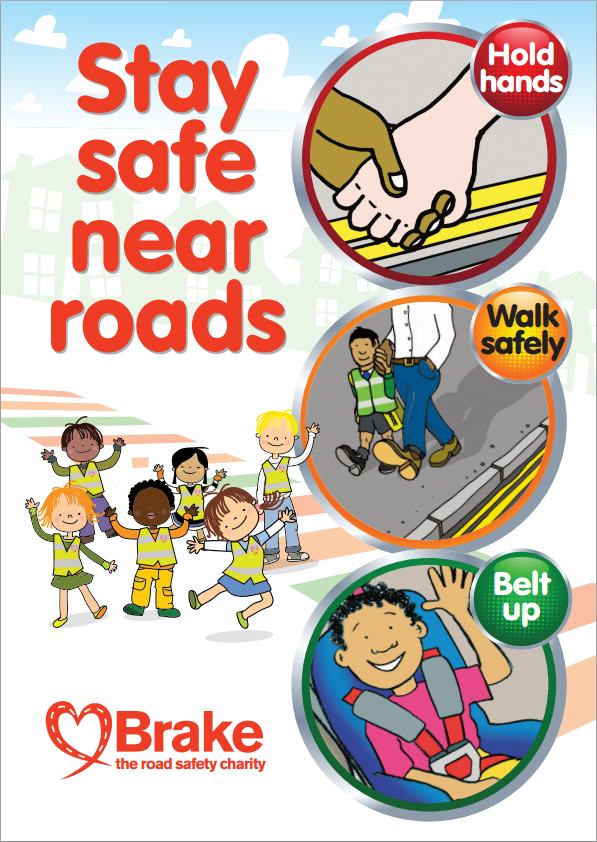
Children who are too young (infants and toddlers) will not understand your instructions well, and you will have to step in often. Older children, on the other hand, like taking control of things. Ask them specific questions about a rule so that they understand. You can also give them choices to let them feel a sense of control. For example, put two shirts in front of them, and let them choose one to wear.
4. Set consequences when rules are broken
Children are bound to break the rules occasionally. Thus, you must ensure they know the consequences when they break one. Be consistent with implementing the decided consequence because if you let it go a few times, they will learn that they can break the rules and get away with them.
In some cases, you can ask them to make the rules themselves to remember them better. Further, remind them of the rule and the consequences occasionally. For example, if they have the habit of throwing toys on the floor, ask them what would happen if they broke a new toy.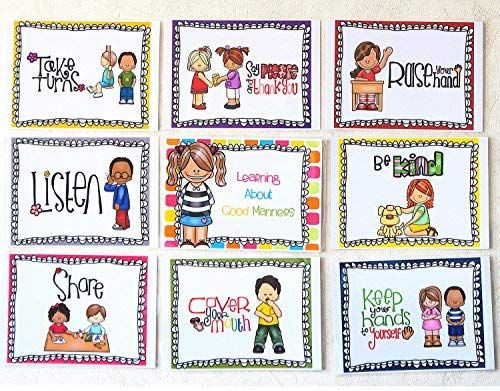 They will most probably answer, “No new toys for a while.”
They will most probably answer, “No new toys for a while.”
5. Help your children follow the rules
Track your child’s progress and make visual aids for them to understand and remember the rules. Praise them when they follow the rules, just as you enforce the consequences when they break them.
Make sure you never shout at or shame them in anger. If rules are not being followed, discuss with them only after you have overcome your anger. In some cases, removing a child from a potential rule-breaking situation might help.
Related: 6 Family Rules Essential For A Disciplined And Harmonious Life
6. Follow the rules yourself
Children learn by watching you. If you do not practice a rule, do not expect them to follow it either.
If you do not follow a rule for any reason, explain it to your children in clear terms. For example, if you have an early bedtime rule for the children, but you stay awake, explain why you do so.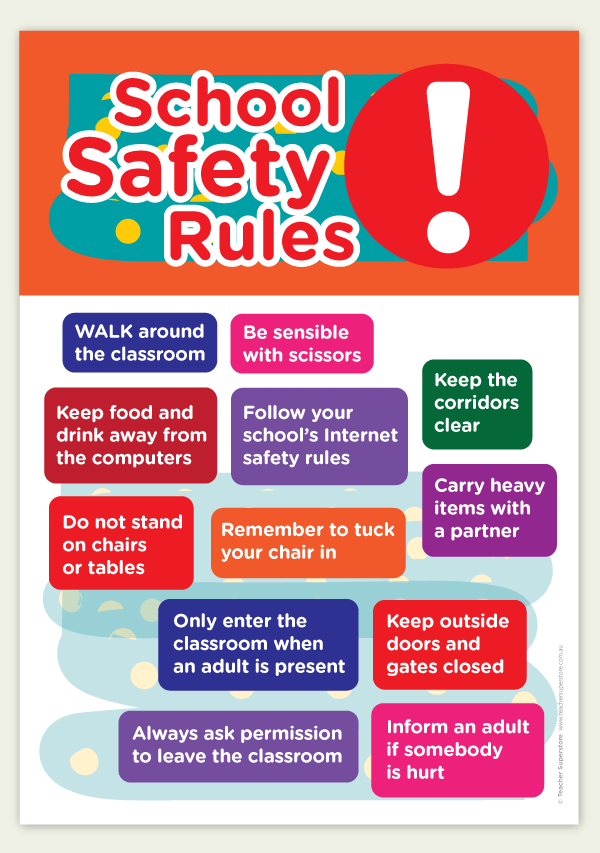 This will help them understand the difference and follow the rules you do not or cannot follow.
This will help them understand the difference and follow the rules you do not or cannot follow.
26 House Rules For Children
Humans are social creatures and require structure to perform efficiently. These basic house rules will ensure that your house runs smoothly and has less yelling and tantrums overall. A home with rules is an efficient home.
1. Knock before entering
This is a basic but important rule. It is helpful for children to understand the importance of personal space and privacy. As your children grow, they will require privacy themselves. Thus, the sooner your children learn it, the better.
2. Respect everyone in the household
It doesn’t matter if a family member is older or younger; respecting every family member is a non-negotiable rule. Name-calling, answering back, walking away rudely, slamming doors, and throwing objects in anger are disrespectful behavior and should be discouraged.
3. Do not exceed your screen time
It is tempting for you to give your children an iPad or switch on the television so that you can get some work done or when you are too tired to engage with the children meaningfully.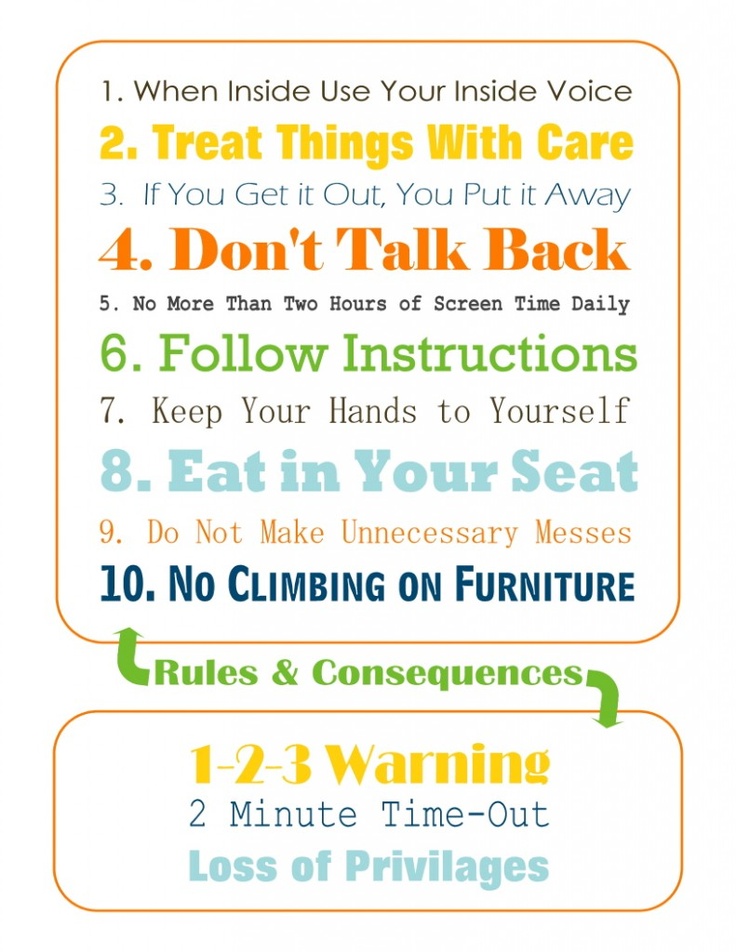 While extended screen time is okay once in a while, regular extended screen time might cause more harm than good for your child. Fix a set screen time and follow it yourself too.
While extended screen time is okay once in a while, regular extended screen time might cause more harm than good for your child. Fix a set screen time and follow it yourself too.
4. Keep your promises
Promises must be kept at all costs. Children have the habit of making rash promises to get out of an awkward situation. They do not do this intentionally, but they are not forward-thinkers as grown-ups. It is up to you to ensure that your children keep their promises.
5. Don’t say anything if you cannot say anything good
This is an important rule, especially in today’s world of social media. People, especially trolls, have the nasty habit of writing rude comments and sending offensive messages under the cloak of anonymity. Children must be made to understand from a young age that if they cannot say anything good, it is best not to say anything at all.
6. Pick up after yourself
This rule will not only help your child but also make your life easier.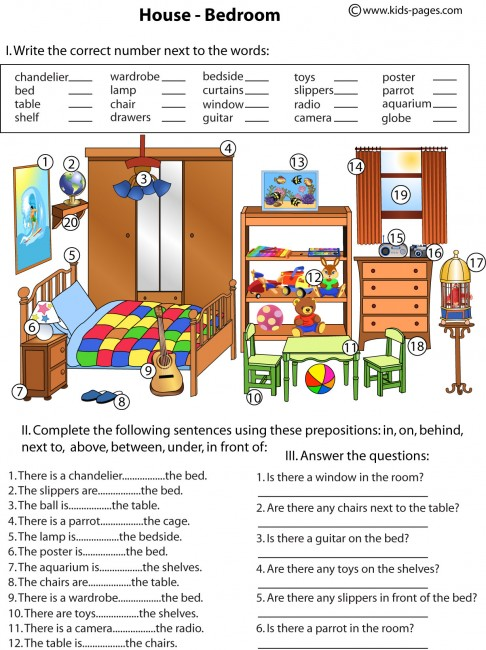 If your children have the habit of asking you for everything and leaving things as they are behind them, set this rule. If they have had a glass of water, they must put it on the counter or in the sink. If they have played with toys, they must put them away before moving on to other things. While you may help them clear up, the sooner you teach your child to pick up after him or herself, the better.
If your children have the habit of asking you for everything and leaving things as they are behind them, set this rule. If they have had a glass of water, they must put it on the counter or in the sink. If they have played with toys, they must put them away before moving on to other things. While you may help them clear up, the sooner you teach your child to pick up after him or herself, the better.
7. Tell the truth
Every child lies at some point in their life. Usually, children in the age group of four to six years have the habit of coming up with stories, and adolescents lie for some self-serving purpose, usually to get out of trouble. While a few white lies are acceptable, the parents must ensure that the children aren’t lying to hide something significant. Children often lie if they fear the parents’ reactions, so take this potential reality into consideration.
Related: 17 Signs That You Are A Strict Parent
8. Respond when someone talks to you
Children are often so lost in their world of music or videos that they do not realize someone is calling them or speaking to them.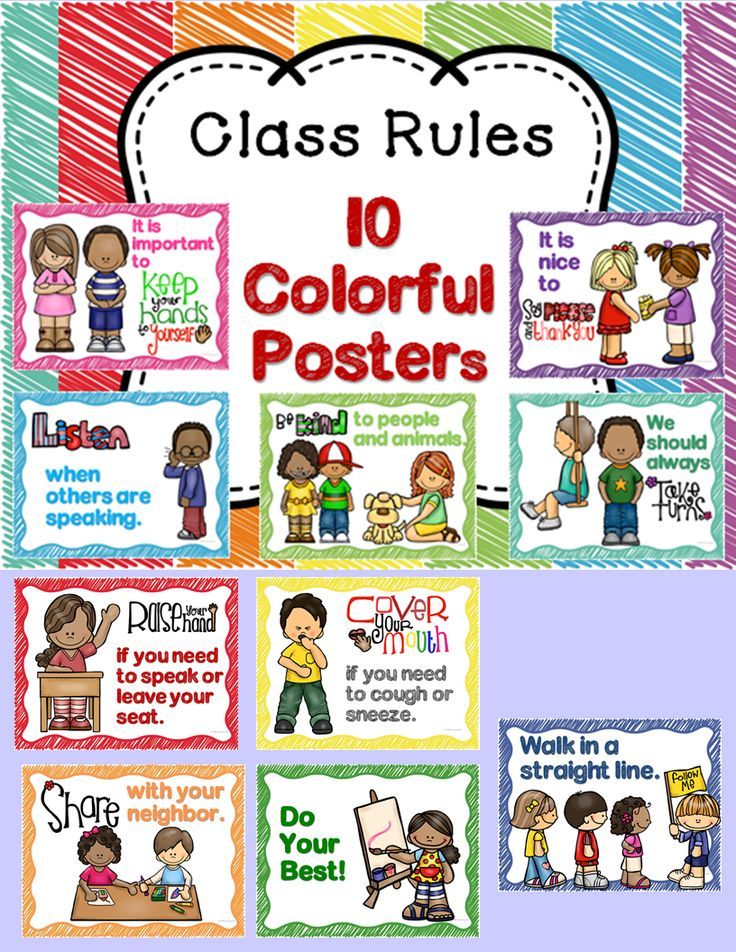 Sometimes, teens or tweens might not respond because they are angry and sulking or because they do not like the person talking with them.
Sometimes, teens or tweens might not respond because they are angry and sulking or because they do not like the person talking with them.
This rule ensures that children respond every time someone talks to them. Sitting mum when someone asks them something is rude. If they do not want to interact with someone or aren’t comfortable, they should excuse themselves and leave the room.
9. Inform the family about a new project well in advance
Although this is more applicable to school-going children who have an uncanny habit of springing a surprise on you the night before they have to submit a science assignment at school, it could apply to tweens and older children too. If they have something on their calendar, they should inform the family well in advance and not request you at the last minute.
10. If your plans change, inform the parents
Children often make plans on the spot depending on their moods. However, if they have a change in plans, it is their duty to inform you.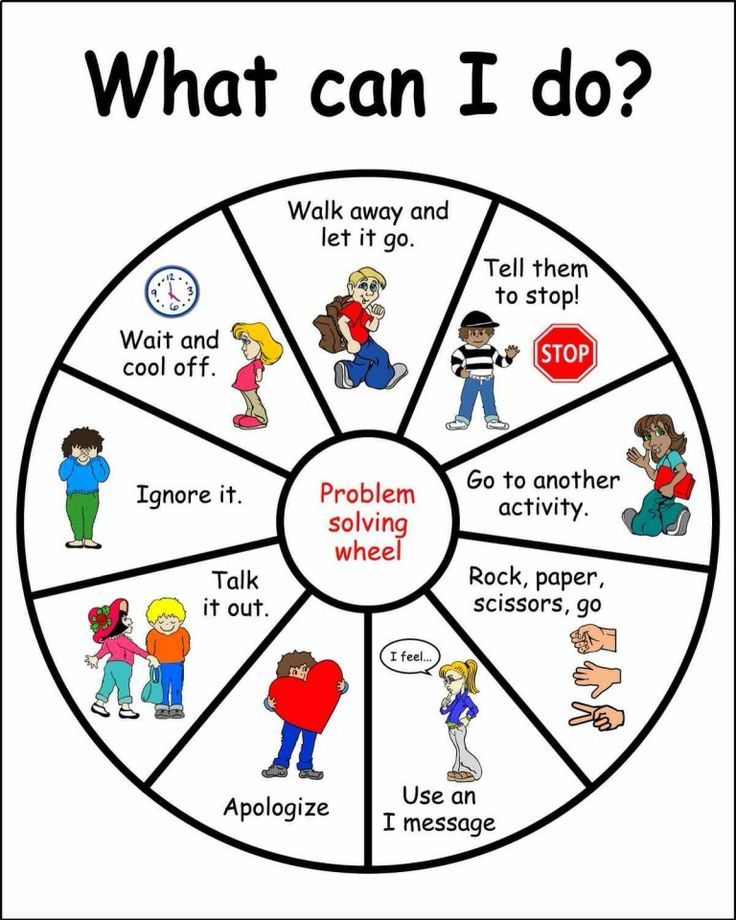 Whether they plan to walk outside during their sleepover, go to a friend’s house after school, or watch a movie on their night out, they should inform you if the plan is newly made.
Whether they plan to walk outside during their sleepover, go to a friend’s house after school, or watch a movie on their night out, they should inform you if the plan is newly made.
11. Say the magic words
As parents, we usually do not expect our children to say “please” or “thank you” after everything we do for them. However, teaching them the power of these magic words is crucial. Not only do the parents get a positive affirmation from these words, but the children learn that they have to use these in the real world to make a good impression.
12. Wait for your turn to speak
The sooner you teach your children to wait their turn before speaking, the better it is for you and them. Children always have something to say, and they will most likely want to tell it the moment the thought pops up in their head. However, if you are already talking to someone, the child has to learn to wait until you and the other person have stopped talking before they can say something.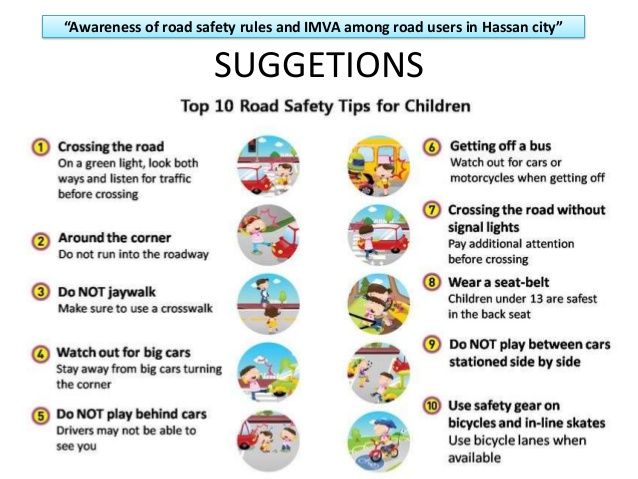
When you have finished talking to the other person, make sure you ask your child what they want to say and listen to them carefully. This validates their feelings.
13. Know that with privilege comes responsibility
If you do not want your child to grow into an entitled adult who seizes everything they want without caring for others feelings, you must teach them the value of privileges. Emphasize the importance of fulfilling responsibilities to earn privileges. When children learn that privileges are earned and not served on a platter, they will remain grateful for their privileges and not misuse them.
14. Maintain proper hygiene
This might seem to be a no-brainer, but expecting your children to maintain basic dental and body hygiene is vital. When life becomes hectic, the first things to be sacrificed are bathing and brushing. This rule will ensure that they follow hygiene practices no matter how tough life is and stay healthy.
15. Borrow only after asking
Even if something belongs to the parents or siblings, children need to know that they can borrow something only if they ask the owner’s permission.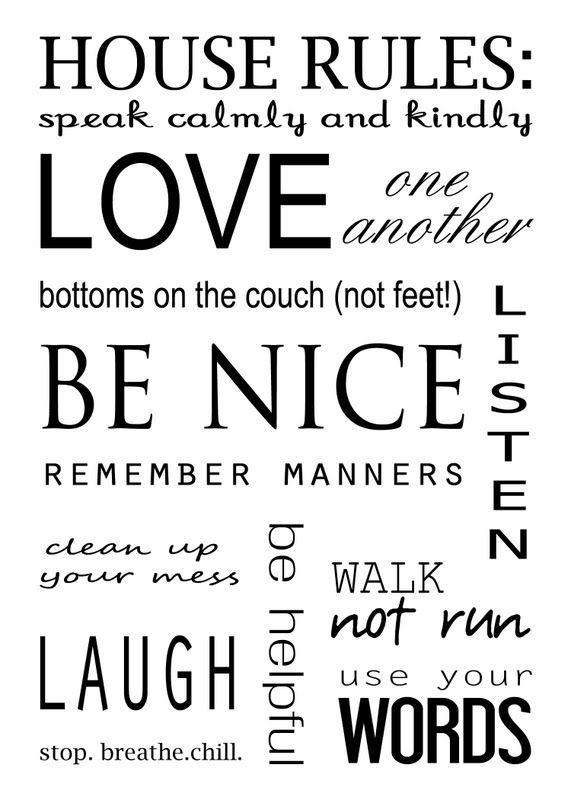 If you skip this rule at home, your children will not realize that they cannot borrow other people’s possessions without permission, and they might start taking what they want without asking. This will most likely earn them a bad name.
If you skip this rule at home, your children will not realize that they cannot borrow other people’s possessions without permission, and they might start taking what they want without asking. This will most likely earn them a bad name.
16. Do not take your parents efforts for granted
If children are not made to understand the difficulties their parents face to provide them a good lifestyle, they might start taking things for granted both inside and outside the home. They might make demands without realizing how much you have to go out of your way to accommodate their requests. Let your children know the effort and hard work you put in so that they never take you for granted.
17. Return borrowed items to the owner in the same condition
If your children have borrowed something from others, it is their responsibility to take care of the item and return it to the owner in the same condition they borrowed it and within the allotted time frame. This rule ensures that your children are mindful of others’ belongings.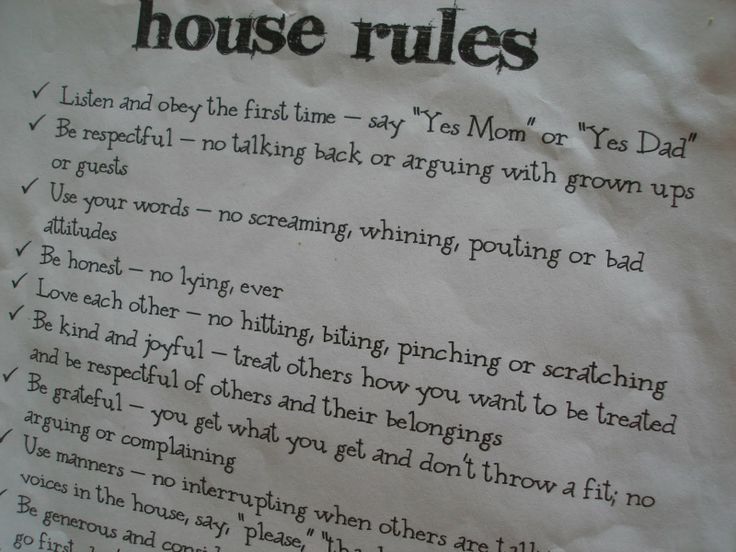 This also teaches children that they can earn other people’s trust by handling their property with care and returning them well before or on the date expected.
This also teaches children that they can earn other people’s trust by handling their property with care and returning them well before or on the date expected.
18. If you make a mess, clean it up
Children are known to create messes. However, they must learn that if they create a mess, they should clear it up. If they cannot clean by themselves, they should ask an adult to assist them. This is not only important for them to learn about the importance of cleanliness and take responsibility but also reduces the chances of unintentional hazards, such as slipping on the floor they have spilled water on.
19. Attend family gatherings
Most family gatherings are happy events that involve food, drinks, games, and lots of laughter. They are an excellent way for children to socialize. If you do not have any family nearby, you can arrange for a gathering of friends. If none of your friends are free to drop in, you can arrange for your family to have game nights, movie nights, or debate nights.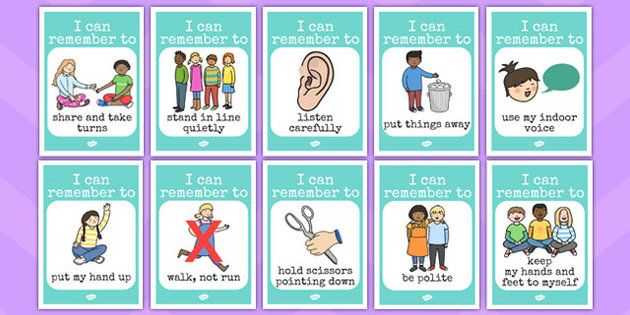 Every family member can choose an activity according to their preference, and everybody in the family must participate. If this is difficult, it may be beneficial to join a parents’ group and organize group playdates.
Every family member can choose an activity according to their preference, and everybody in the family must participate. If this is difficult, it may be beneficial to join a parents’ group and organize group playdates.
Related: 55 Fun Indoor And Outdoor Games For Family Reunion
20. Think before you speak
Thinking before speaking is an important habit that will hold your children in good stead all through their lives. Teach them the value of words and the effect they cause on other people’s feelings. This rule will make them understand how important their words are, and they will learn to use them wisely.
21. Apologize and make amends when someone is hurt
Saying sorry and getting out of the scene is easy for children. Often, they do not understand the implications of their actions and the effect they have on others. Thus, they may say sorry and forget about the situation. However, they must be made to understand the result of their actions, and they should not only apologize but also make amends to the person they hurt.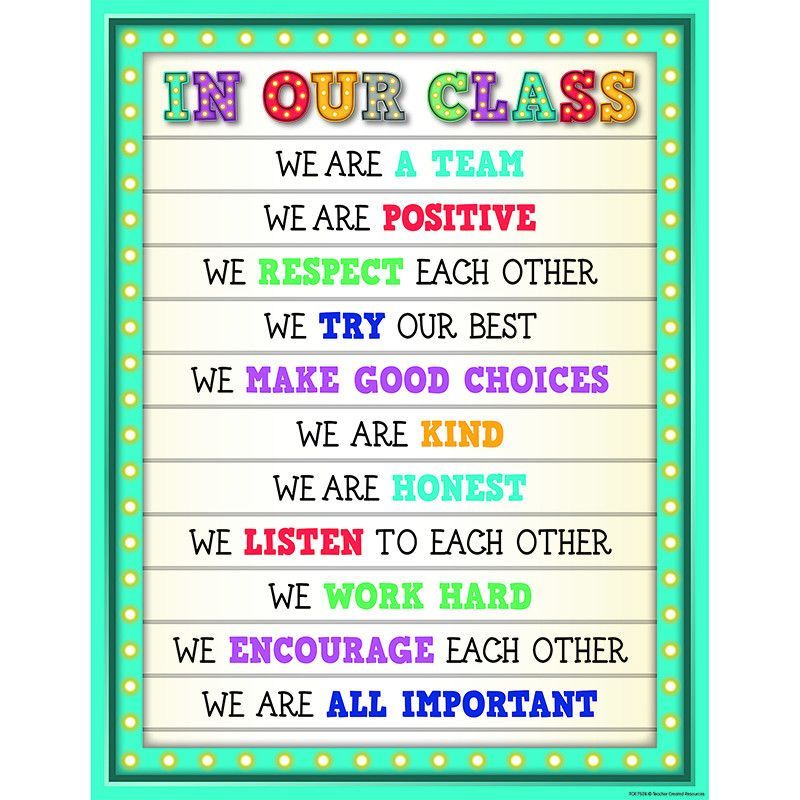
22. If you take something from somewhere, return it to the same place
How many times do you find things taken from the kitchen and left in the living room? Once they are done with an item, most children simply leave them there and move on to the next thing that catches their interest. This can be highly frustrating to the others in the family when they cannot find the item. This rule will make sure children place things in the right places.
23. If you take the last of something, tell at least one parent
Whether it is the last cookie from the jar or the last pencil from the stationery set, children need to tell you that it was the last thing to you so that you can put it on your shopping list. Failing to do so might cause endless problems, the worst of which involves discovering an empty packet on a hectic day.
24. Keep an open mind
The world is diverse, and every day, your child has the chance to meet people who do not conform to their understanding of the world.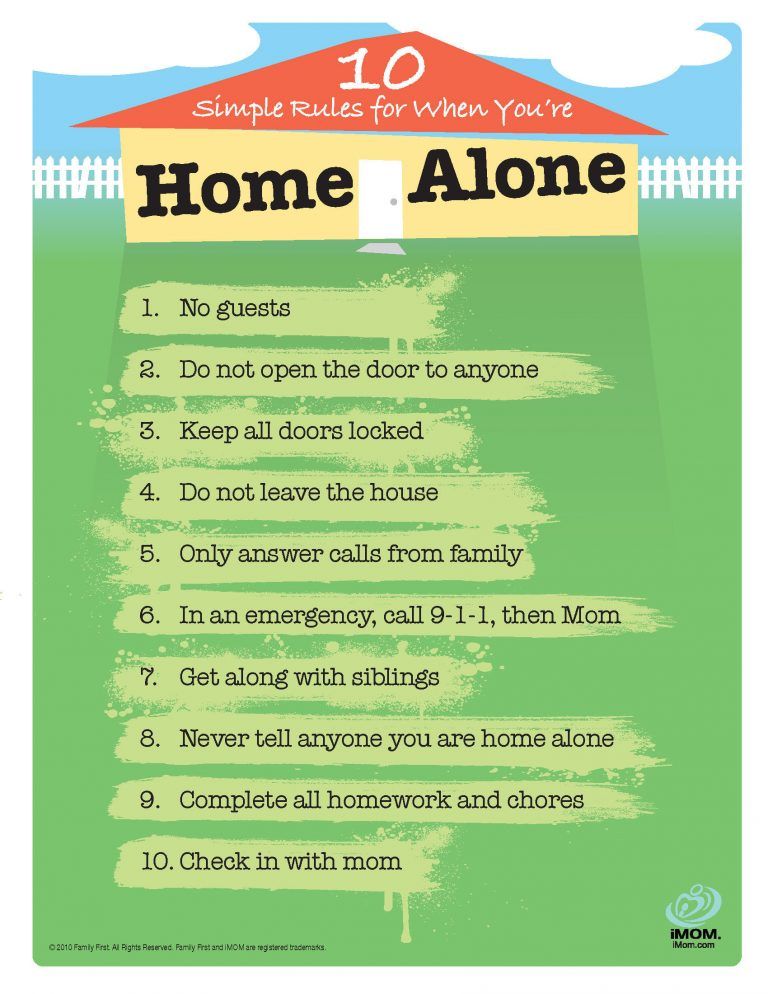 This rule teaches them to have an open mind and accept people who are different from them. These differences might be physical, mental, spiritual, religious, sexual, or any other. This rule will enable your children to embrace other cultures and encourage them to mingle with new people even in the future.
This rule teaches them to have an open mind and accept people who are different from them. These differences might be physical, mental, spiritual, religious, sexual, or any other. This rule will enable your children to embrace other cultures and encourage them to mingle with new people even in the future.
Related: What Are Kids Scared Of And How To Help Them Manage Fears?
25. Never bully others
Everyone hates a bully. They take pleasure in other people’s sufferings. It is necessary that you encourage them not to be one. Also, encourage them to stand up against bullying and inform the authorities whenever they witness one.
26. Be empathetic
There are not enough empathetic people in the world. Being empathetic means understanding the struggles of another person and lending them an ear. You may not be able to help them. But you can at least listen to their troubles and try to alleviate them. Raising empathetic children is the need of the hour.
House rules for kids are important because they ensure an organized lifestyle and help develop disciplined individuals.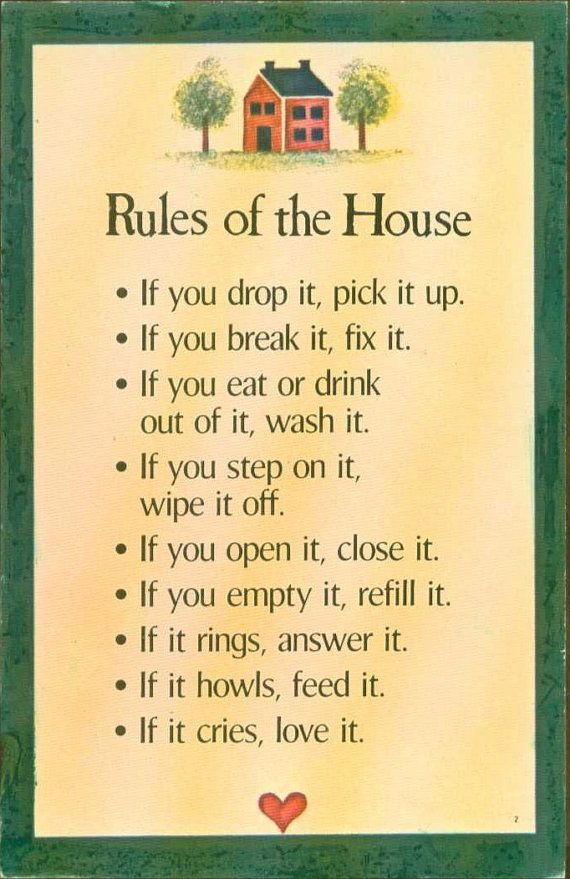 Setting house rules will enable you to slowly prepare your children for the challenges of the outside world. However, before choosing the house rules, consider your children’s opinions, keep their age and maturity level in mind, and be a good role model by following the rules yourself. Some simple house rules that you may set are knocking before entering a room, not exceeding their screen time, or waiting for their turn to speak. Though children may miss out on following the rules some days, you need not worry about it. Instead, ensure that they follow the rules on most days. Gradually, these rules will help them develop good habits and make them well-balanced individuals.
Setting house rules will enable you to slowly prepare your children for the challenges of the outside world. However, before choosing the house rules, consider your children’s opinions, keep their age and maturity level in mind, and be a good role model by following the rules yourself. Some simple house rules that you may set are knocking before entering a room, not exceeding their screen time, or waiting for their turn to speak. Though children may miss out on following the rules some days, you need not worry about it. Instead, ensure that they follow the rules on most days. Gradually, these rules will help them develop good habits and make them well-balanced individuals.
Key Pointers
- Respecting all family members, irrespective of their age, should be non-negotiable in any family.
- Be polite and use words, such as “please” and “thank you,” every time someone says or does something nice for them.
- If you make a mess, clean it up; children can learn to clear any mess they create the next time.
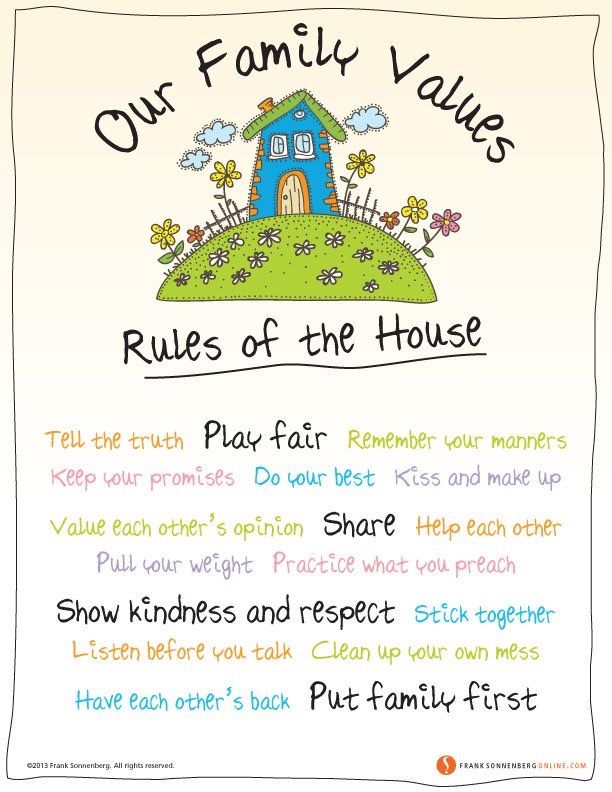
References:
MomJunction's articles are written after analyzing the research works of expert authors and institutions. Our references consist of resources established by authorities in their respective fields. You can learn more about the authenticity of the information we present in our editorial policy.
- Essentials for Parenting Toddlers and Preschoolers.
https://www.cdc.gov/parents/essentials/structure/rules.html - How to Teach Good Behavior: Tips for Parents.
https://www.aafp.org/afp/2002/1015/p1463.html - Screen Time and Children.
https://www.aacap.org/AACAP/Families_and_Youth/Facts_for_Families/FFF-Guide/Children-And-Watching-TV-054.aspx - Lying and Children.
https://www.aacap.org/AACAP/Families_and_Youth/Facts_for_Families/FFF-Guide/Children-And-Lying-044.aspx
The following two tabs change content below.
- Reviewer
- Author
Nisha Bharatan is a freelance writer with experience in writing health and finance content for various Indian and international clients.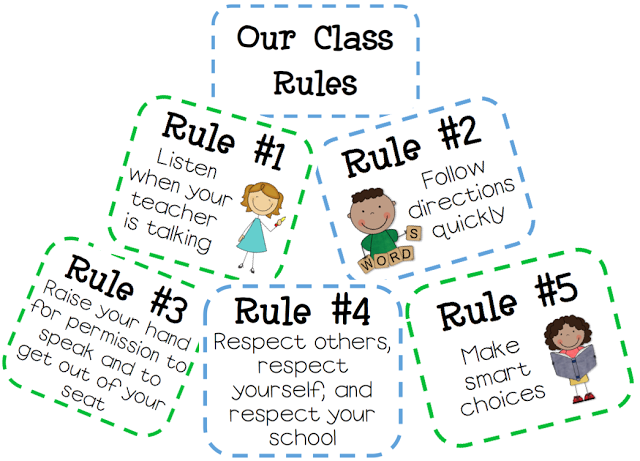 After completing her engineering from Savitribai Phule Pune University, she did content marketing courses to complement her interest in writing. Nisha writes articles centered around kids’ development, their activities, crafts, games, and fun elements that keep children and families entertained....
After completing her engineering from Savitribai Phule Pune University, she did content marketing courses to complement her interest in writing. Nisha writes articles centered around kids’ development, their activities, crafts, games, and fun elements that keep children and families entertained....
View Profile ›
Natalie Jay is a Licensed Clinical Social Worker in San Diego County with a specialty in depression, anxiety, trauma, couple therapy, and addiction. She has a Bachelors degree in Psychological & Brain Sciences from Washington University in St. Louis and a Masters degree in Clinical Social Work from San Diego State University. Natalie has worked for county non-profit agencies as...
View Profile ›
75 household chores that can be entrusted to a child
How, when and at what moment should a child be involved in household chores? The expert says "Oh!" and child psychologist Anna Skavitina.
Anna Skavitina, psychologist, analyst, member of the IAAP (International Association of Analytical Psychology), supervisor of the ROAP and the Jung Institute (Zurich), expert of the journal "Psychologies"
Modern children, starting from kindergarten, are often so occupations, that the affairs of the family for them remain something distant and incomprehensible.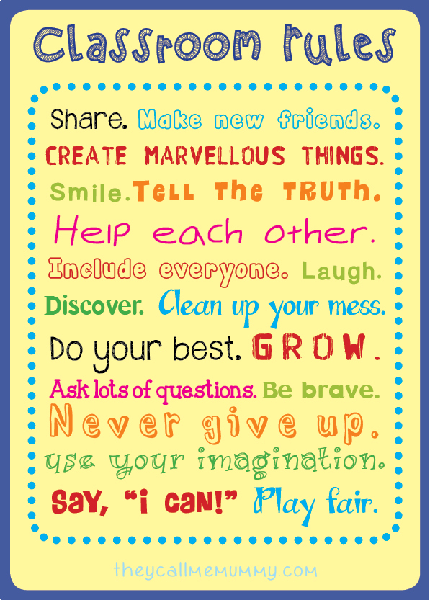 I know a lot of guys who not only don't help their mom prepare food, but have never even seen her do it, because the food gets to them immediately ready. I know 15-17-year-old teenagers who have never swept the floor because their mothers took care of them - they will still work out.
I know a lot of guys who not only don't help their mom prepare food, but have never even seen her do it, because the food gets to them immediately ready. I know 15-17-year-old teenagers who have never swept the floor because their mothers took care of them - they will still work out.
So can it be true, leave the children alone, let them rest before the wedding or before the army? Why burden them with work that many adults do not like? Much easier to take and do everything yourself. Grow up and learn somehow. In the meantime, we will not exploit child labor.
Eternally studying, having fun, doing drawing, music, sports, children are absolutely helpless in situations of ordinary life. They can only function properly if they are maintained. They don't understand that money doesn't appear as if by magic in a nightstand, and things don't put themselves in a closet.
And when they have their own family and children, then life turns into an ongoing struggle against chaos, because you have to serve not only yourself, but also the kids. It’s good if they have parents who can take on part of the housework, or money to outsource it: a housekeeper, a nanny, a cook… - and was surprised to find ... an empty refrigerator. No, she understood that food got there from the store, but she didn't understand why it was empty?
It’s good if they have parents who can take on part of the housework, or money to outsource it: a housekeeper, a nanny, a cook… - and was surprised to find ... an empty refrigerator. No, she understood that food got there from the store, but she didn't understand why it was empty?
Our task as parents is not only to feed the children on time, but also to teach them how to get food, to structure the chaos around them. This usually helps to maintain some order in the head as well. Adults who have not mastered this skill remain children forever. The same guys who have family responsibilities feel like a full-fledged person who has been given their place. They see the world as more stable and predictable.
With the help of family responsibilities, we help children become more organized, later this skill is transferred to study, work, and planning their lives.
When I say “duties”, I am not at all suggesting that you delegate this or that homework to the child, demanding perfect performance. Rather, it is a process of gradual learning that is built into constant activity, a kind of home economics and survival circle. Here is an indicative, but by no means mandatory list of what you can try to entrust your child.
Rather, it is a process of gradual learning that is built into constant activity, a kind of home economics and survival circle. Here is an indicative, but by no means mandatory list of what you can try to entrust your child.
At 2 years old:
- sweep the floor;
- wipe the dust;
- help with dressing;
- put removed clothes on a chair;
- bring shoes to yourself or other family members, finding a pair;
- help hang up the washed clothes, handing out small items;
- put the sorted linen into the washing machine;
- put the toys back.
At 3 years old:
All the same plus:
- fold toys, books by yourself and with the help of an adult; choose your clothes from the general pile of things;
- dress yourself;
- fasten and unbutton clothes and help relatives;
- help set the table - put napkins, cutlery;
- put the dishes behind you in the sink, wipe the crumbs off the table;
- bring glasses, book, phone;
- queue for the swing and wait;
- play alone for a short time;
- show in familiar places where to go towards home;
- stop making noise when asked;
- share sweets or fruits equally among all;
- to play alone in the street (supervised, but without the participation of an adult).

At 4 years old:
All the same plus:
- help wash dishes;
- make and make your own bed;
- help cut lettuce;
- cook a simple dessert with an adult;
- choose products in the store together with an adult, putting them in a trolley;
- prepare yourself a simple breakfast: get cereal and milk, make a sandwich;
- hang small items on the dryer;
- play at home without constant supervision.
At 5 years old:
All the same plus:
- to help thread the needle;
- wind the thread onto the spool;
- pour yourself and everyone cold drinks;
- pay for small purchases;
- disassemble laundry for whites and colours;
- sort cutlery in the kitchen cabinet, put things in order;
- carefully hang things on a chair after undressing;
- hang your outerwear in a closet;
- put your clean linen in the closet;
- feed a pet;
- clean up after the pet as directed by an adult;
- to pick berries.
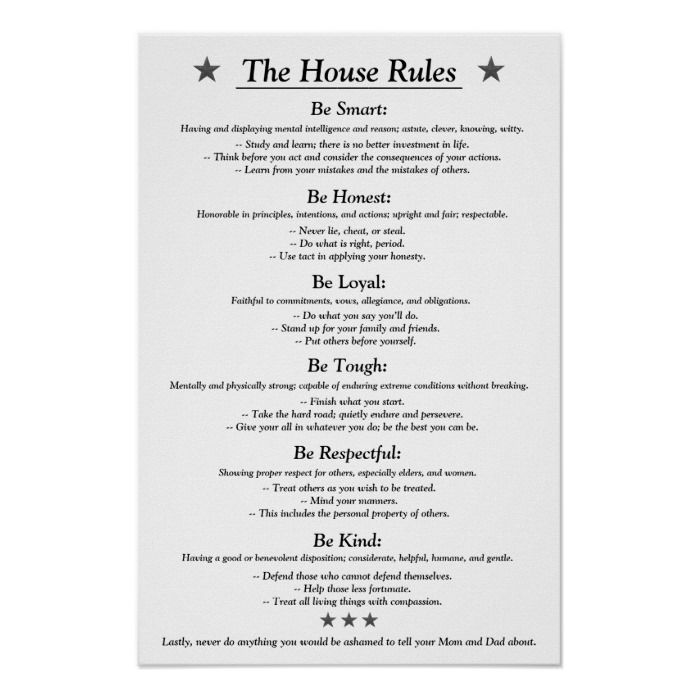
At 6 years old:
All the same plus:
- put the coins together, sorting them into piles of the same value;
- separate washed small items into categories;
- count the number of guests (up to ten) and help set the table in accordance with the number of people, check that there is enough for everyone;
- vacuum the room and carpets;
- water the flowers;
- help take out the trash;
- to use a rake in the garden;
- cook simple meals by yourself: hot sandwich, boiled eggs;
- collect your belongings for kindergarten, school, adult testing club, or according to a written or drawn list.
At 7 years old:
All the same plus:
- watch the time with hands and report;
- help everyone tie their shoelaces “on a bow”;
- choose your own clothes according to the weather;
- independently collect a portfolio;
- wash and clean vegetables;
- leave the toilet and bathroom in order;
- bathe a pet;
- walk with a small pet;
- set up a new phone;
- download applications;
- change batteries.
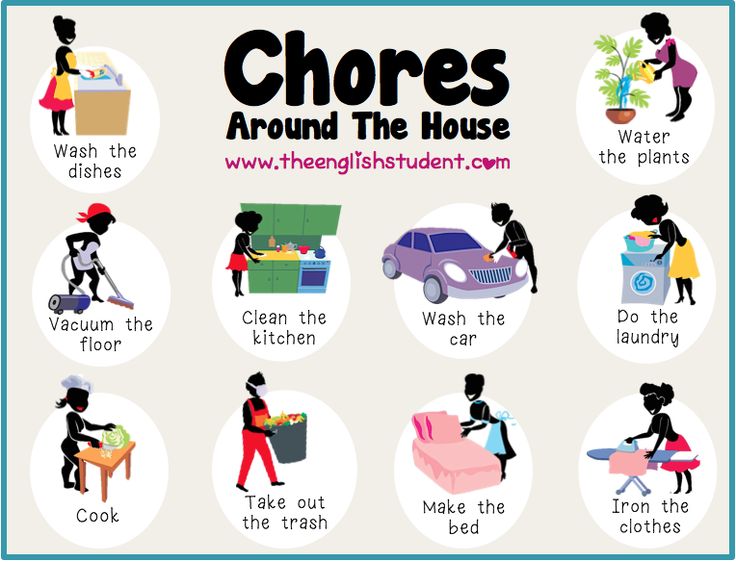
At 8-9 years old:
All the same plus:
- go to bed, wake up in the morning on their own by the hour;
- carry purchases;
- disassemble purchased products;
- iron small items;
- tidy up your closet;
- carry out various assignments of parents;
- help with feeding younger children;
- sew on buttons;
- sew up a small open seam in clothing;
- participate in family councils for the distribution of part of family income;
- fill a bath for yourself and others;
- pick fruit from trees;
- kindle a fire and cook food on a fire with the participation of adults;
- learn new culinary recipes from books and with the help of search engines;
- make simple presentations in computer programs.
But the most important thing is not a to-do list, but how, when and how to stimulate children to fulfill their duties. From a very early age, try to do all the household chores with your child.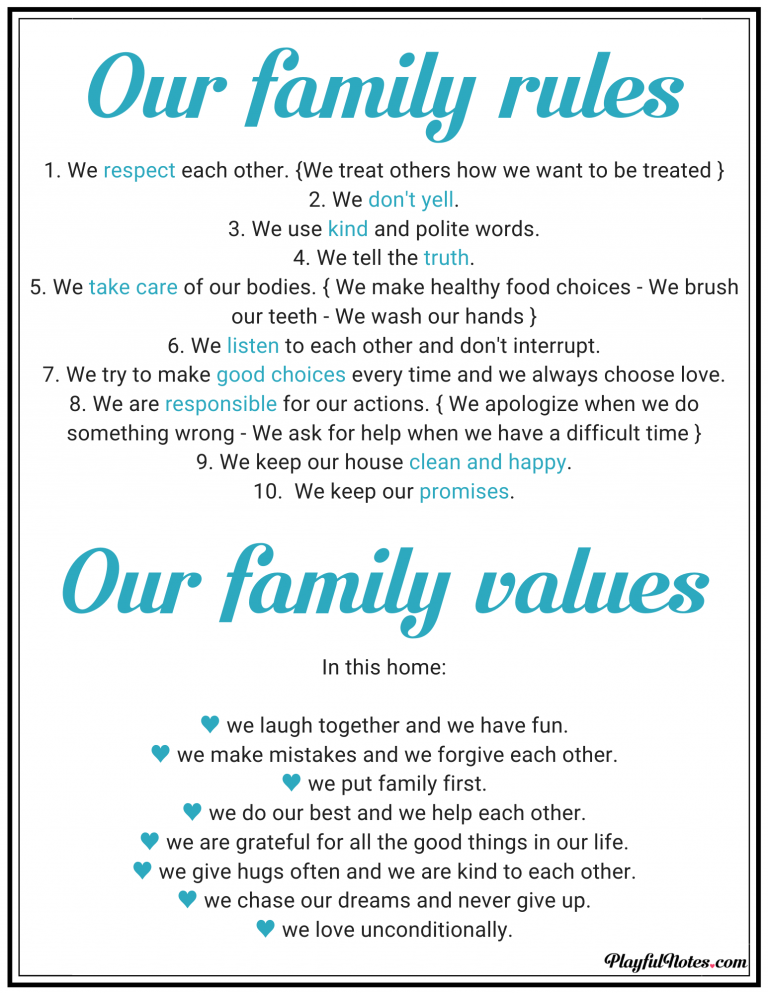 Yes, it takes longer to clean an apartment or bake pies with him, but you don’t need to entertain him with a tablet, and in addition, the child receives communication with his mother and useful skills for life. Mom hangs up the laundry? At the age of one and a half, the baby serves small things, at three - hangs tights and socks on the dryer, at five - learns to cope with large things.
Yes, it takes longer to clean an apartment or bake pies with him, but you don’t need to entertain him with a tablet, and in addition, the child receives communication with his mother and useful skills for life. Mom hangs up the laundry? At the age of one and a half, the baby serves small things, at three - hangs tights and socks on the dryer, at five - learns to cope with large things.
It is not worth giving a small child constant tasks, it is better to give him the opportunity to try himself in different activities. There is absolutely no need to ask your child to do the same as you. He can do his small, but undoubtedly important and valuable business. Do not force, but rather offer options, ask how he would like to help you today. Of course, this will improve your relationship with the child.
Well, the time you spend alone is better spent not on cleaning, but on something more pleasant: lie down in the bathroom, watch a movie, meet a friend, go to a hairdresser.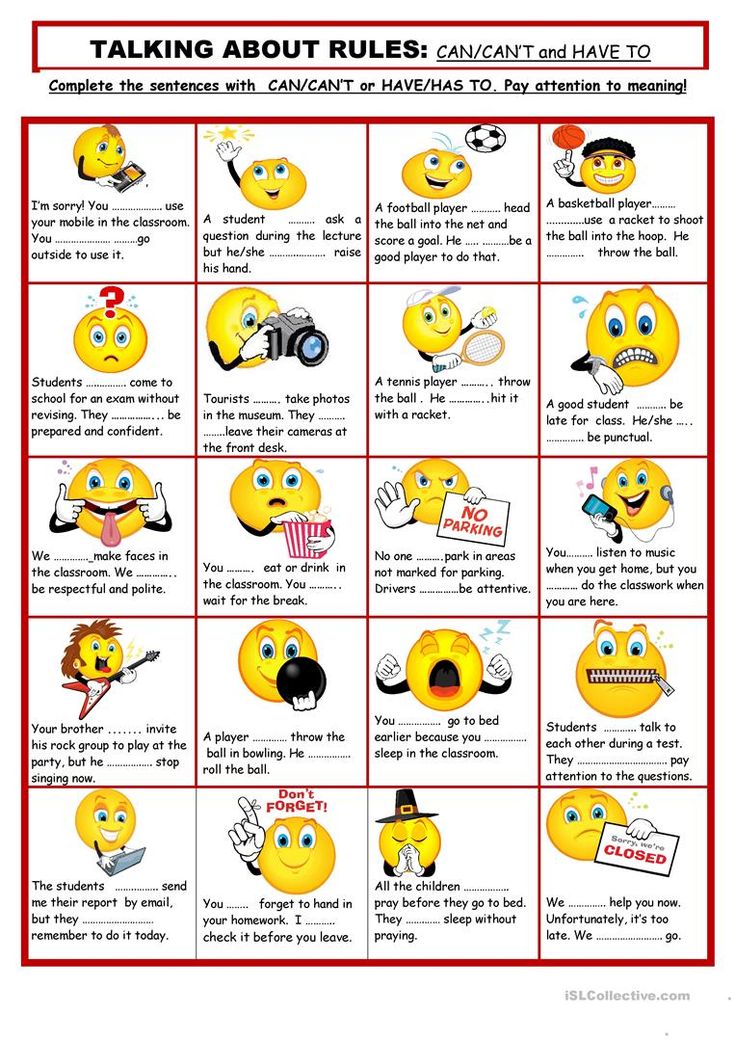 No, if you just love cleaning, then, of course, you can do it too, but then do only what you definitely don’t need the services of a little helper.
No, if you just love cleaning, then, of course, you can do it too, but then do only what you definitely don’t need the services of a little helper.
At an early age, at 2-4 years old, a child is full of initiative! That is why it is so important to support him, to praise him for his efforts, even if the result is not always good and you want to exclaim in your hearts: "Oh, I'd rather do it myself!" Kind words to a child who wants to help have a delayed effect. And when you really need help, he will be able to provide it - and will do it on his own initiative, and not because you forced him.
See also:
Types of incentives and their importance in child development
Setting rules for the child at homeParents often worry that the house is often a mess, no matter how hard they try to maintain order and discipline.
These are the rules! Although children do not develop reasoning abilities until age 5 or 7, they follow rules instinctively if they are followed correctly.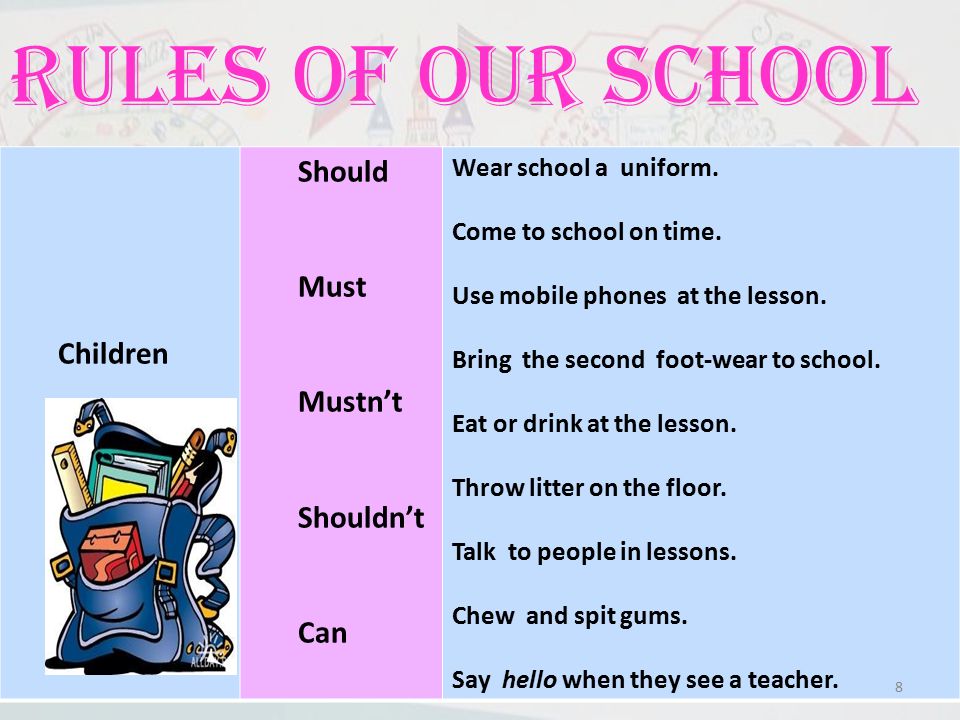 your house.
your house.
You are looking for: Allergies in children and how to deal with them
How should parents set house rules for children?
You will soon discover that writing a list of rules and hanging it on the refrigerator will not work even on the first day. It is necessary to develop a framework and think about how to deal with it.
Some tips for making family databases:
Discuss home rules for children with a partner.
Whether you make rules for younger children or older children, be clear about the purpose of these rules with your partner. What are you trying to achieve with rules? Is it the general rules of parenting or home improvement Dealing with a child with behavioral problems? Set clear goals around these things, because the last thing you want are pointless rules.
Hold a family meeting to discuss house rules for children.
There is nothing better than a serious family gathering to highlight the seriousness of the situation, especially if you have children of preschool or preschool age.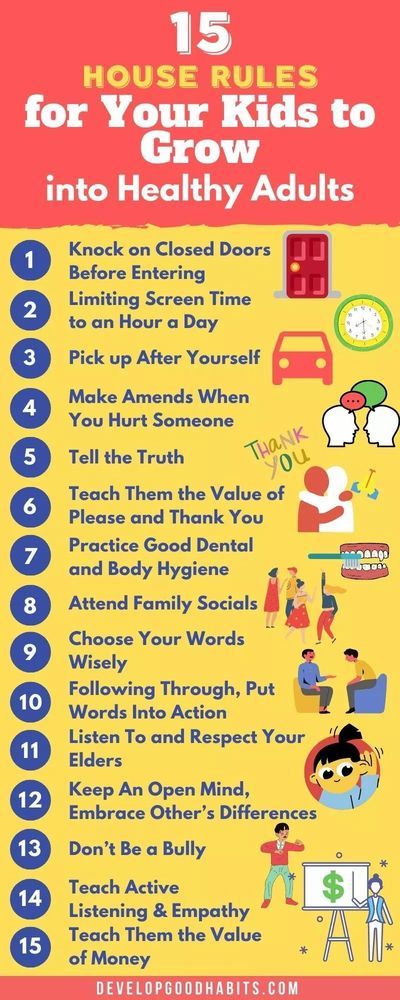 Gather the family and set the rules. Let the kids get involved and you'll be surprised how productive it can be.
Gather the family and set the rules. Let the kids get involved and you'll be surprised how productive it can be.
Teamwork begins to set house rules for children
The family must work as a unit to operate the equipment. Teamwork is how you respect each other's opinions, opinions, and actions while helping out at home. A simple rule of thumb is to ask permission before lending an item.
Make house rules clear and specific for children
Unclear goals and rules are waiting to collapse. Children need structure to grow up, and while they say they hate rules, they need it to keep things predictable and safe. A strict rule like never skipping housework will keep everyone in order.
House rules for children should be written down.
The success of the implementation of the rules depends on how often they are reminded. Write the rules on a piece of paper and post it in a visible place, such as on a door. Refrigerator where you can see it. For younger children, you can make an illustration and hang it if necessary.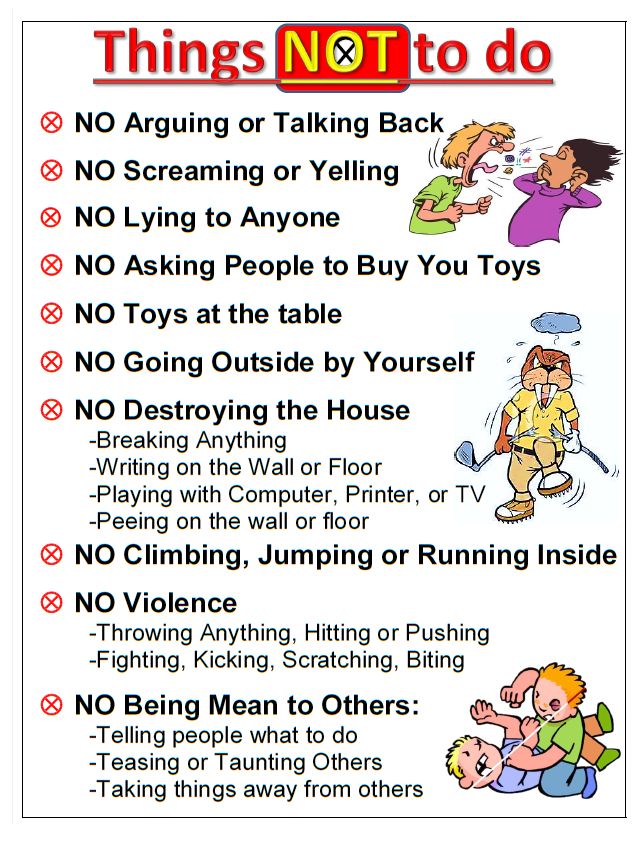
You need: amber teething necklaces, despite their benefits, they are considered harmful to the child them and their stages of development. One such example is sleep time. You can't send your 3 year old and 10 year old to bed at the same time!
Setting rules for a child at homeSet different indoor and outdoor rules that can let your kids run indoors and play any game they want. However, when they visit their grandmother or a friend, they cannot do the same. So have clear rules of discipline when you are abroad.
Set an example by setting rules for children
If you don't practice what you preach, you won't stick to the rules. Your children are constantly watching and learning from your behavior. They will relax at the first hint that you are not following strict rules.
Use praise and consequences after setting house rules for children
Praise is a great motivator that keeps children in the classroom. On the other hand, the right consequences will also help enforce house rules. Remember that praise works best, so consider it.
Remember that praise works best, so consider it.
Review the rules of the orphanage if necessary.
Sometimes the rules you define may contain something bigger and better. In such cases, you can reevaluate and change it to improve.
What you need: the need for sleep for children, the appropriate number of hours of sleep per day for your child
Important rules for children. Preschool House Rules can be divided into several main categories, as follows:
Safe House Rules for Kids
These are the simplest rules that promote your child's physical and emotional well-being. Some common examples are "don't jump on the furniture", "don't drive out onto a busy street", or "don't open the door when mom is in the bathroom and no one is home".
In addition to setting the rule, you need to tell them what will happen if the rule is broken. Emotional safety rules include "Speak kindly and use kind words." “Share your feelings and thoughts accordingly.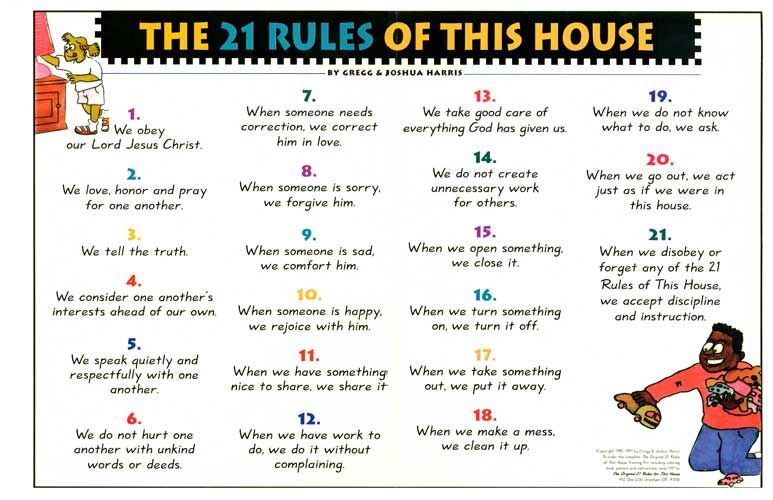 ” Emotional safety rules also help children communicate well with others.
” Emotional safety rules also help children communicate well with others.
House Rules for Children to Develop Healthy Habits
It goes without saying that healthy habits form the basis for discipline in more complex tasks as the child grows. In order to help them do their best, you need to get your kids into a routine or daily routine.
Setting rules for the child at homeSome examples include "brushing teeth before going to bed", "putting all dirty clothes in the laundry basket", and "washing hands and feet after playing outdoors".
Healthy habits also reduce power struggles with your children, because when they know they have to put all their toys back in the basket after playing or finish their homework before dinner, they know the consequences of bad behavior.
House rules for children that depend on morality
Moral rules play a big role in shaping the person your child grows up to be. So create rules that instill moral values in your children.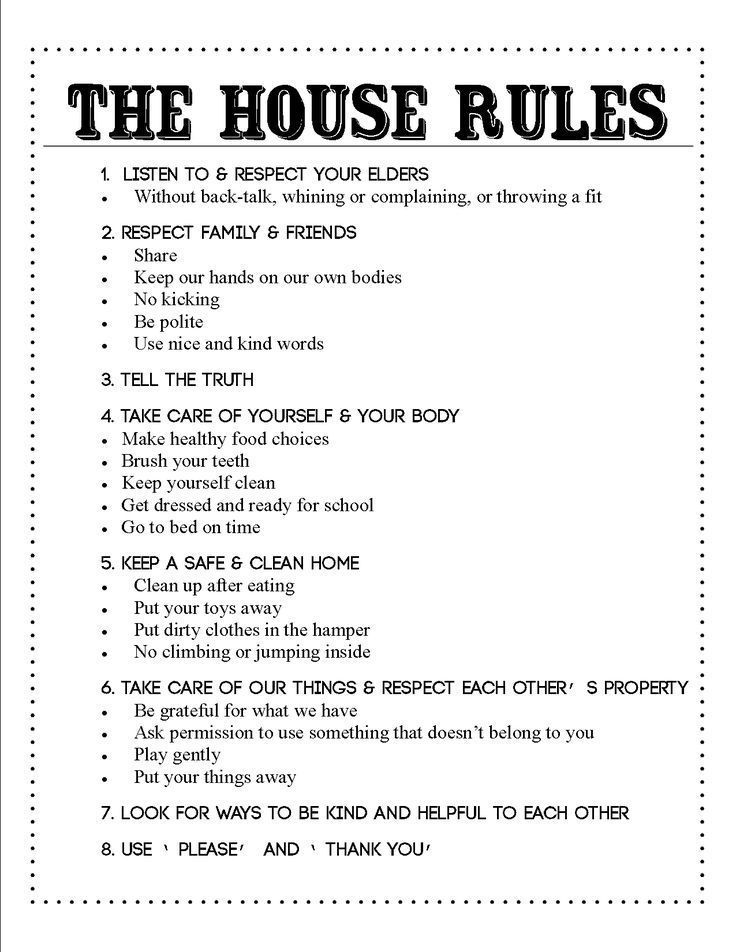 The simplest ones include "Tell the truth" and "Apologize for the mistake."
The simplest ones include "Tell the truth" and "Apologize for the mistake."
Ethics also have a strong influence on how well they follow the rules you set. Of course, your behavior matters a lot when you set an example for your children. Your children are more aware of what you do than what you preach, so eventually your moral standards infiltrate your children.
social skills rules
Social skills rules are very important for children's healthy development and need rules to teach them behaviors that make them socially desirable and acceptable to their peer group. If they have siblings, the rule of thumb is "share your games with your brother", "take turns playing", or "knock before entering a locked door".
These rules are to help them become socially acceptable and play games with other children at the age of four. Older kids and teens who stick to their gadgets need rules of etiquette like "the dining table is a phone-free zone." It is also important that they sleep without a smartphone.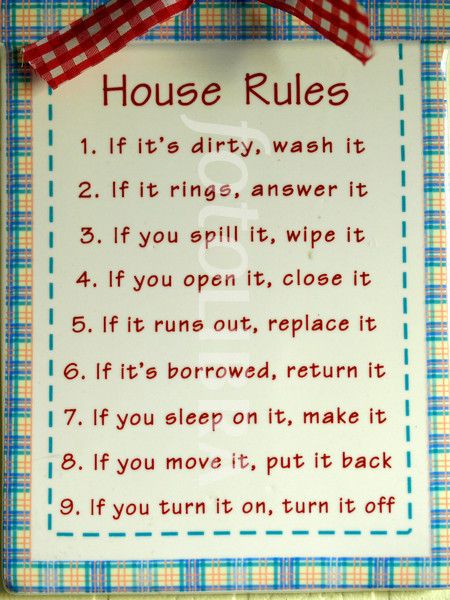
Real world skills rules
Real world skills rules. These rules will help your children when they leave the house. They also take stock to ensure that all of the above rules are followed.
School work is enough for some kids to take responsibility and stay motivated, while others need a little more. One of the easiest is to get them involved in the business. Even if they are very young, you can start them off with simple tasks like sorting dirty clothes in a hamper. As they get older, you can reward them with money for more difficult tasks so they learn how to handle money. .
What to do if house rules are violated?
Usually parents decide the consequences of breaking the rules; But it is best if the consequences are agreed with your child. For example, if your child breaks healthy play and playtime rules and you ask him about the consequences, he might respond, "I guess I won't play with a toy for a while." So, instead of giving it up because of a broken rule, you can say, "Looks like you've decided not to play these games for a while.